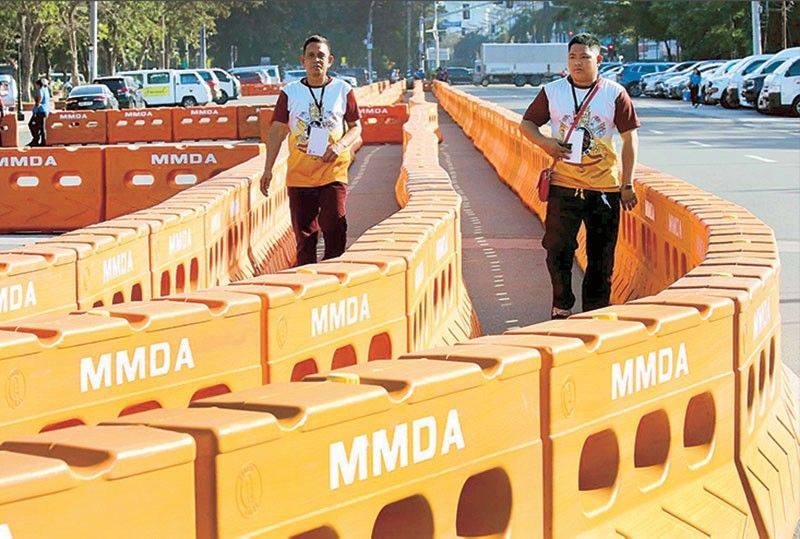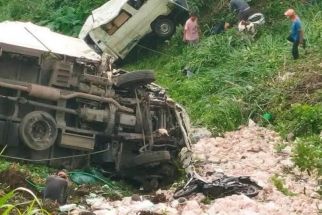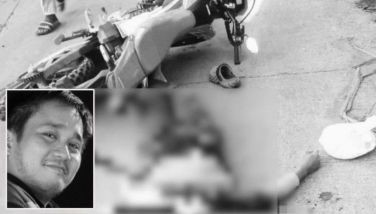Devotees told: Follow traslacion protocols

MANILA, Philippines — Devotees of the Black Nazarene are urged to follow security protocols during the traslacion, which will be held on Jan. 9, for a faster and more organized procession.
Quiapo Church rector Fr. Rufino Sescon Jr. said the cooperation of the participants is crucial for an orderly traslacion.
“We call on devotees to understand that expressing faith also involves obedience,” Sescon, who is also the bishop-elect of the Balanga diocese, said.
He encouraged devotees to refrain from blocking the path or attempting to climb the andas or carriage of the Black Nazarene, saying this could slow down the procession and would prevent others from seeing the wooden image of Jesus Christ.
“We are returning to the old devotion, where Jesus Nazarene is the main focus,” Sescon said.
Devotees can carry waist bags, but will be subject to inspection. They are also advised to bring clear plastic or garbage bags for their belongings.
Those joining the traslacion are discouraged from bringing banners, medium-size or life-size Nazareno images, drone cameras and flammable materials, among others.
According to the Catholic Bishops’ Conference of the Philippines, more than 14,000 police and security personnel will secure the procession of the centuries-old image of Jesus Nazarene.
Six million attendees are expected to join the procession, according to the Manila city government.
About 11,000 personnel will be deployed by the Armed Forces of the Philippines.
Eight firetrucks will be sent by the Manila Fire Department and other fire districts.
For this year, the carriage transporting the Black Nazarene was redesigned anew to give more people a clear view during the traslacion.
The procession will start at daybreak from the Quirino Grandstand. It will turn right to Katigbak Drive and pass through Padre Burgos street, Ayala Boulevard, Quezon Boulevard and the streets of Arlegui, Nepomuceno, Aguila and Hidalgo before heading to San Sebastian Church, where the traditional dungaw will be performed.
Last year, officials said 6,113,598 people joined the traslacion or attended masses at the Quiapo Church.
The 2024 traslacion was the fastest in more than 10 years, lasting only 14 hours, 59 minutes and 10 seconds.
The traditional pahalik or kissing of the image of the Black Nazarene at the Quirino Grandstand will begin at midnight of Jan. 7.
Metro Manila hospitals on ‘Code White’
Meanwhile, the Department of Health (DOH) has raised the Code White alert in Metro Manila hospitals and health facilities for the traslacion. Health Assistant Secretary Albert Domingo said the Code White alert status would be in effect from Jan. 6 to 10.
“Our hospitals are ready for the traslacion,” Domingo said.
The Code White alert will likely be declared in other regions since the Nazarene feast is also being observed in other parts of the country, he said.
Under the Code White alert, medical personnel are on an “on call” status for immediate mobilization to respond to emergencies.
The DOH advised those not feeling well not to join the traslacion.
“If they have fever, cough or colds, do not join the procession anymore,” Domingo said.
He also urged traslacion participants to stay hydrated by drinking plenty of water.
PCG to deploy personnel
The Philippine Coast Guard (PCG) will deploy over 1,100 personnel to support other law enforcement agencies and the Manila government in securing the Black Nazarene feast.
“The PCG would assist in ensuring public safety against possible risks, including terrorism, stampedes, fire within nearby areas and natural disasters, such as an earthquake during the religious event,” PCG Commandant Ronnie Gil Gavan said.
The PCG personnel deployed include Coast Guard K9 teams, explosive ordnance disposal units, special operations groups, civil disturbance management teams and response groups.
They are dispatched until Jan. 10 and will be assigned at the Quirino Grandstand, Jones Bridge and around the Quiapo Church. — Rhodina Villanueva
- Latest
- Trending































